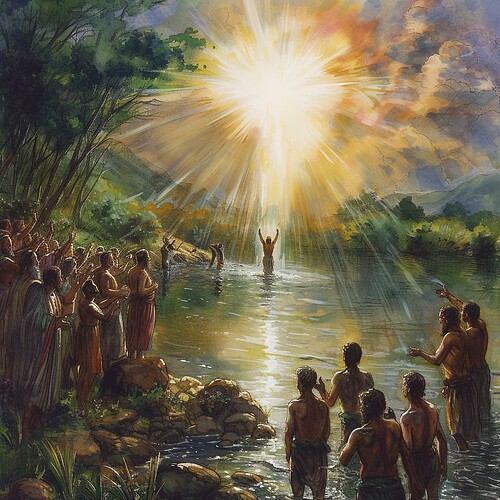 February 5: Mark 1 - The Calling and Ministry of Jesus Begins
February 5: Mark 1 - The Calling and Ministry of Jesus Begins
 Introduction
Introduction
Today we delve into the action-packed first chapter of Mark, where Jesus begins His mission to spread the Good News of God’s Kingdom. John the Baptist prepares the way, Jesus is baptized, overcomes Satan’s temptation, calls His first disciples, and demonstrates His authority through preaching and healing.
![]() John Prepares the Way
John Prepares the Way
John the Baptist’s mission was prophesied in the Old Testament. As a voice in the wilderness, he prepared people’s hearts for Jesus’s arrival, preaching repentance and baptism as symbols of cleansing and renewal.
![]() Key Verse: Mark 1:3 - “the voice of one crying out in the wilderness: ‘Prepare the way of the Lord, make his paths straight,’”
Key Verse: Mark 1:3 - “the voice of one crying out in the wilderness: ‘Prepare the way of the Lord, make his paths straight,’”
![]() Jesus is Baptized and Tested
Jesus is Baptized and Tested
Jesus’s baptism was not for repentance but to signify the beginning of His ministry. His divine identity is confirmed by the Holy Spirit descending upon Him, and God the Father’s voice from Heaven. Subsequently, Jesus was led into the wilderness to be tempted by Satan, a trial He triumphed over, fortifying His resolve for the mission ahead.
![]() Key Verse: Mark 1:11 - "And a voice came from heaven, ‘You are my Son, the Beloved; with you I am well pleased.’”
Key Verse: Mark 1:11 - "And a voice came from heaven, ‘You are my Son, the Beloved; with you I am well pleased.’”
![]() Key Themes and Reflections
Key Themes and Reflections
This chapter unveils the immense power and authority of Jesus, the start of His mission, the importance of faith, and the urgency of repentance and redemption.
![]() Today’s Application
Today’s Application
John calls for repentance, which remains an essential Christian principle today. As believers, we are constantly called to reevaluate our lives, retract from sin, and draw closer to God. Jesus’s resistance during His temptations speaks to our own daily battles against evil forces, reminding us of the strength we can draw from God.
![]() Hidden Gem
Hidden Gem
The rapid pace with which events unfold in Mark’s Gospel is worth noting. This style, along with frequent use of the word “immediately,” underscores the urgency of Jesus’s mission.
![]() Reflective Q&A
Reflective Q&A
![]() Why did Jesus get baptized?
Why did Jesus get baptized?
A: Jesus’s baptism signified the commencement of His public ministry and affirmed His divine identity.
![]() Why did angels minister to Jesus after His temptation?
Why did angels minister to Jesus after His temptation?
A: Angels provided comfort and reassurance to Jesus, showcasing divine intervention and the heavenly reward that follows obedience and perseverance.
![]() Join the Discussion
Join the Discussion
Reflect on a time you confronted temptation. How does Jesus’s handling of temptation speak into your experience?
![]() See You Tomorrow in Mark 2: We’ll explore how Jesus shocked religious leaders by demonstrating His authority over sin and illness.
See You Tomorrow in Mark 2: We’ll explore how Jesus shocked religious leaders by demonstrating His authority over sin and illness.
May we remember today the example set for us in Mark 1 - of faith, perseverance, and God’s omnipotent love and power.
 Subscribe to our newsletter
Subscribe to our newsletter
Subscribe to our newsletter at newsletter.aignitescripture.com for daily readings and exclusive content.
From thoughtful reflections to community highlights, get everything delivered straight to your inbox. Secure your spot today and be a part of our growing community!
